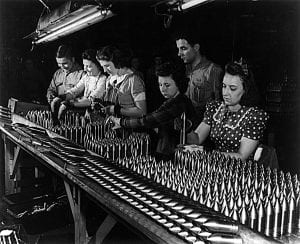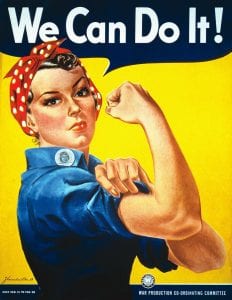In the American Revolution, they dashed onto battlefields to man canons that had lost their Continental soldier to enemy fire. They pressed their ears against fireplaces to listen to British secrets being discussed for George Washington’s spy ring. They organized city-wide boycotts so effective that it brought the English Parliament to the negotiating table. Who were these adept spies, makeshift soldiers, and political agitators? They were women who desperately wanted their children to grow up in a new nation brimming with possibilities they would never know.
Throughout our country’s storied history of war and peace, there are many constants that I teach in my US History class – military strategy, national goals, a general, unwavering spirit. One constant that has existed throughout every war is that of the important role of the home front, and those who man those lines. Note: pun very much intended. Without a support of the home front, or those who are not fighting in combat, a war cannot be won, I say.
In my humble opinion, the United States is at war. Much like the Spanish Flu Pandemic of the early 20th century, our enemy is practically invisible. It doesn’t wear a uniform. It doesn’t fall back with an insurgency. It’s shifty, ubiquitous, and makes us call the very air we breathe into question. The enemy has no political goals. It won’t be subdued with geopolitical diplomacy. It’s insidious, and it’s only means of direction is to cause as much destruction as it possibly can. While the front lines fight tirelessly, the home front faces their own sets of challenges.
The constant of the home front has always been mothers. War affected them doubly throughout history: expecting to continue to carry on duties of wife, mother, housekeeper, and role model while also rationing, throwing fundraisers, taking low paying jobs for government agencies. In World War II, the government pleaded with women of the country to take jobs in the defense industries to make pieces of airplanes, tanks, and bombs. For young, unmarried women, this instilled a sense of patriotism and employment possibilities they had never known. For married women with children, the patriotism called, but the traditional obligations remained on top of their new duties resonated. Some did it all with red lipstick and perfect ringlet curls pinned to their head scarves.
The front lines of the war waging outside my door look different than what I’ve taught in my class – medical professionals thinly clad in recommended protective gear, wage workers clocking in every day at their stores, truck drivers guzzling hot coffee for another round of deliveries to a nation shut indoors. Meanwhile, the home front is doing what it always does – making it work.
They closed the schools and said, make sure they keep learning. And we did. They said work remotely to maintain your paycheck. And we did. They said you have to figure out how to keep your kids happy, fed, healthy, entertained, stimulated, and mentally secure in the midst of a terribly scary time. And we did. They said our doctors, nurses, respiratory therapists, and janitors are at great risk due to the lack of PPE, so make them some. And we did. We dust off our Brother’s sewing machines and pop open some YouTube videos. We draw chalk mosaics while answering emails. We use nap time for Zoom meetings. We stretch every bit of food in our pantry because social distancing is at its worst inside of grocery stores. We gather ourselves in the bathroom because the fear of going without seeing our elderly parents, dipping performance at work, raising our voice in such a way we never imagined, and our own deteriorating energy is too much to bear. Then we pick ourselves back up because people have it way worse than us. And we do it all over again.
I have learned this much in the war – my sacrifice pales in comparison to the men and women on the front lines. But I am allowed to buckle under the weight of so many. I’m allowed to acknowledge the load in my household is not always divvied fairly between my husband and myself. As I steal a moment or two for answering emails, grading, or planning while he works uninterruptedly, I can feel sorry for myself for a short while. I’m allowed to look at the disproportionate expectations of mothers in this war, call it out in my deeply feminist heart, and go back to making it work regardless.
Is this how the women of Boston felt as they organized boycotts while swept floors and peeled potatoes? Is this what it was like to plant a Victory Garden once it was discovered the United States would enter the Great War? Maybe. Maybe not. But in my great moments of weakness, a see a flash of yellow, blue, and red in my mind’s eye and hear the phrase, “WE CAN DO IT.” And just like that, we do. We always do.





















